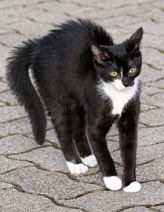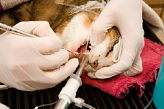Cat Teeth

Cat Health Care and Cat Teeth--home maintenance
Dental hygiene is just as important to cats as it is to humans. If we don't brush and floss, our breath smells bad, our gums get infected, and our teeth fall out. The same holds true for feline teeth.
Cats use their teeth for capturing, killing and preparing food, and as defensive tools. Kittens are born without teeth (there are very few exceptions) and by eight weeks of age, they have 26 milk teeth called deciduous teeth. The 12 incisors, six on top and six on the bottom at the front of the mouth, first appear at about two to three weeks of age.
At four weeks, sharp canines appear next to the incisors, one on each side of the mouth, top and bottom. Between three and six weeks, the premolars grow behind the canines, three on top and two on the bottom. The last deciduous premolar shows itself by six to eight weeks of age.
Adult cat teeth replace baby teeth at about three to four months of age, when permanent incisors appear. The remaining permanent teeth come out when the kitten is four to six months old. Baby teeth are replaced tooth for tooth and four more teeth are added to the mix: four molars, one on each side, at at top and bottom.
These teeth act like scissors to shear flesh and crush bone. At total of 30 cat teeth are present by the time a cat is seven months old. If the baby teeth don't fall out, they should be pulled to avoid misalignment, eating and hygiene problems.
It is recommended to brush your cat's teeth at least once a week. Cleaning the teeth is important to maintaining oral health during a cat's lifetime. Bad breath, when present in adult cats, can be a sign of dental disease, inflammation of the mouth, viral infection or metabolic problems. Human toothbrushes are often too large and stiff for a cat's mouth and the amount of fluoride in most human toothpaste can lead to kidney damage in a cat.
Special brands are available from your pet store and your veterinarian. I can hear you groan at the thought of putting your fingers in your cat's mouth but they sometimes sleep with us and lick us so it's not such a bad place after all. An online pet store that has dental toothpaste and supplies is Entirely Pets a vendor of pet supplies, medicine, treats, and more.
It's best to start brushing cat teeth when it's a kitten so it'll be accustomed to it throughout it's life. If your cat is an adult and you've never tried to brush it's teeth, your first attempt won't be a pleasant one. However, there are some steps you can take in preparation.
First, start by petting your cat. Slowly progress from rubbing and scratching the cheeks and chin to gently stroking it's lips and touching it's mouth. Do this for short periods of time over several days. Reward your cat with play or a healthy treat.
Next, try rubbing the cat teeth and gums with one finger. Don't force the mouth open...simply slip your finger through the lips into the cheek. Try putting a little feline toothpaste on your finger.
Next, wrap a soft cloth around your finger. Spread the toothpaste on the cloth and massage your cat's teeth and gums as long as it tolerates it.
You may then want to try a finger toothbrush that slips over your finger and has tiny rubber bristles on it. It may take you numerous tries before your cat accepts a finger toothbrush.
If your cat is totally against it, you may resort to my method which is to just use the cloth. The important thing is to consistently clean the teeth. Antibacterial dental rinses are also available to help prevent plaque buildup, promote healing and control bad breath.
For aging cats, daily removal of plaque is very important in preventing and controlling dental disease. Unfortunately, Tart lost a lot of her teeth because we didn't pay attention. Like I've said, it is a learning process and the current cats get more attention paid to their dental needs. Vets have evidence that daily cleaning reduces tartar formation by 95%, and weekly cleanings reduce it by 76%.
Cat Health Care and Professional Cleanings
Cleaning your cat's teeth at home reduces the number of professional cleanings it requires. Cat teeth should be cleaned by the vet approx. once a year for cats under 5 years old. More frequent cleanings are beneficial as your cat gets older. A professional cleaning entails putting the cat under general anesthesia.
An ultrasonic cleaner is used to remove deposits from the teeth and below the gum line, and a polisher smooths out irregularities in the enamel that collects plaque. A fluoride treatment completes the cleaning. If an infection is detected, antibiotics will be prescribed. Decayed teeth are usually extracted.
Bad breath can be caused by a number of things. A cat's breath may smell after eating, but a lasting smell is indicative of a health problem such as:
- gum disease
- poisoning (a garlic smell can indicate arsenic poisoning)
- diabetes mellitus (breath smells like nail polish remover)
- kidney disease (look for mouth sores and an ammonia-like odor. When the kidneys are not functioning properly, waste products are not eliminated from the blood, so they build up. The blood vessels in the gums are numerous and close to the surface, so the high level of waste products is smelled in the mouth. Kidney problems are found most often in cats older than 10 years of age. Diabetes mellitus and gastrointestinal or respiratory diseases can also cause halitosis.
Be aware of your cat's breath, and have him checked by your vet if you suspect any of the above problems. Bad breath, drooling, difficulty eating, mouth pawing and jaw chattering are the clinical signs associated with oral diseases in cats. Common dental diseases found in cat teeth include abscessed or broken teeth, maligned teeth and inflamed gums.
For the list of reliable vendors offering teeth supplies such as cat tooth brushes, go to the Pet Products Page.
Related Articles......
Return from Cat Teeth to Cat Health Homepage
Having trouble finding what you need? Cat Health Index & Site Map
OR
Do you have a question to ask?...Questions
OR
Do you have a cat story to share?...Simply click here to go to that page!
Copyright@2010-2020 All rights reserved.Cat-health-detective.com
This website is information only. Consult a veterinarian for medical assistance

"Like Us" on Facebook
or...
"Like Us" here




















